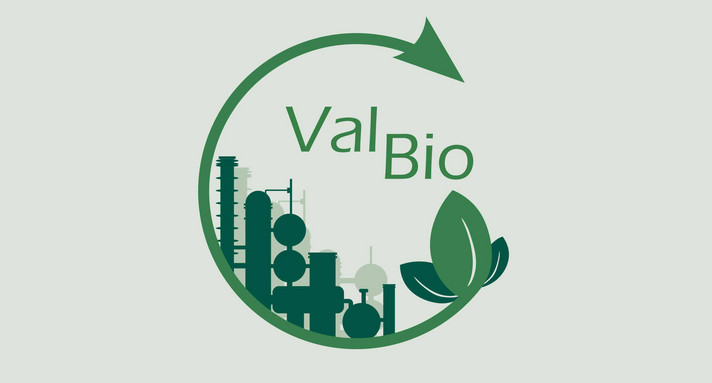The transformation of the economy into a sustainable bioeconomy is a task that concerns business, society and politics alike.
The specifics of the biological transformation require a close cooperation between stakeholders, scientists and users - in cross-sectoral networks.
The initiative Valorization of Bioresources - Urban (ValBio-Urban), launched by scientists at the University of Stuttgart, wants to contribute to the successful shaping of the transformation in Baden-Württemberg. The intention is to bring together researchers from the ValBio-Urban consortium and users in order to facilitate local solutions to challenges.
Example projects
Based on bioeconomy example projects, the feasibility (translation) of ideas and technologies of the ValBio partners is explored together with companies as well as cross-industry and cross-sectoral interest groups:
- Bioconcrete
Nowadays, concrete is one of the most important building materials. However, the production of the binding agent cement causes 8% of the global CO2 emissions. Certain bacteria are also able to initiate the hardening of concrete. Laboratory-scale applications of this bioconcrete already exist. However, there are still no processes where bioconcrete can be used for the production of large-format building components. The aim of the project is to realize a quick transfer of bioconcrete into building practice together with partners from industry.
- Extraction, properties and utilization of organic acids and metabolites from residues and wastes of biomass-processing industry
Biomass is used in industry in various applications. Residues from production or waste are often composted or disposed of in waste treatment plants. However, these still contain valuable substances such as amino acids, sugars and other organic compounds. In the project, the technical and economic potential for the recovery and utilization of organic components from residual and waste materials of the biomass processing industry is determined and process concepts are developed. The aim is to develop an integrated concept for the further development of industrial biomass utilization in Baden-Württemberg.
- Social Perception of Bioeconomy Products in Baden-Württemberg - theoretical and empirical investigation of the social perception and evaluation of ‘products from residues’.
Technologies and innovative bioeconomic products are embedded in a socio-technical system. Here, technical, political and societal factors interact. The aim of this project is to investigate how the translation of bioeconomy technologies and processes can be prepared and accompanied in a methodologically structured way by recording their social perception.
- Microbial valorization of oxygenated Carbon dioxide point emissions
The biological recycling of CO2 from industrial waste gases into valuable materials typically involves strictly anaerobic organisms. A process for this has already been developed. However, if the waste gas contains oxygen, this must be removed in order not to inhibit the bio organisms. There are various conceivable possibilities, but so far they have only been used in laboratory. The aim is to develop a process that can be transferred to industrial-scale implementation. This is to be investigated together with industrial partners.
- Thermal-biological waste recycling through sorption-enhanced gasification (SEG) and microbial valorization
It is already possible to produce a high-quality gas from woody fuels, which can be individually adapted with regard to its composition of carbon monoxide, CO2 and hydrogen. In this project, it will be shown that this process is also suitable for domestic and commercial bio-waste and that the produced gas can be further processed by microorganisms to alcohols and organic acids.
Ways will be sought to bring this technology into widespread use.

